INSCRIBED QUADRILATERALS
Subscribe to our ▶️ YouTube channel 🔴 for the latest videos, updates, and tips.
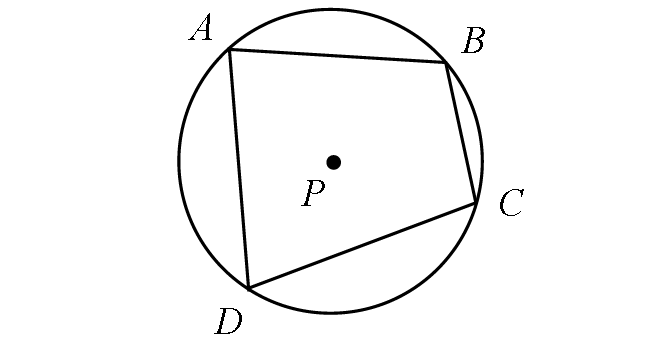
If a quadrilateral inscribed in a circle, then its opposite angles are supplementary.
In circle P above,
m∠A + m∠C = 180°
m∠B + m∠D = 180°
Solved Examples
Example 1 :
In the diagram shown below, find the following measures :
(i) m∠J and (ii) m∠K
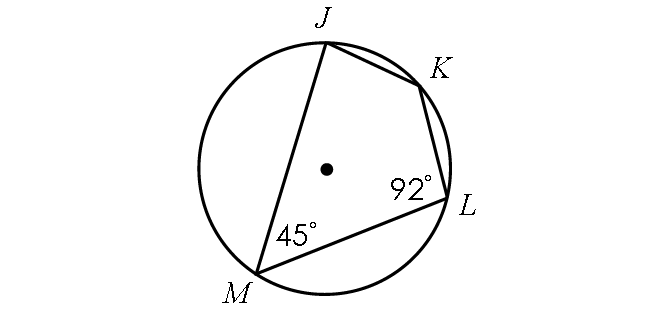
Solution :
In the above diagram, quadrilateral JKLM is inscribed in a circle. Then, its opposite angles are supplementary.
m∠J + m∠L = 180° -----(1)
m∠K + m∠M = 180° -----(2)
Finding m∠J :
In (1), substitute m∠L = 92°.
m∠J + 92° = 180°
Subtract 92° from each side.
m∠J = 88°
Finding m∠K :
In (1), substitute m∠M = 45°.
m∠K + 45° = 180°
Subtract 45° from each side.
m∠J = 135°
Example 2 :
In the diagram shown below, find the following measures :
(i) m∠P, (ii) m∠R and (ii) m∠S
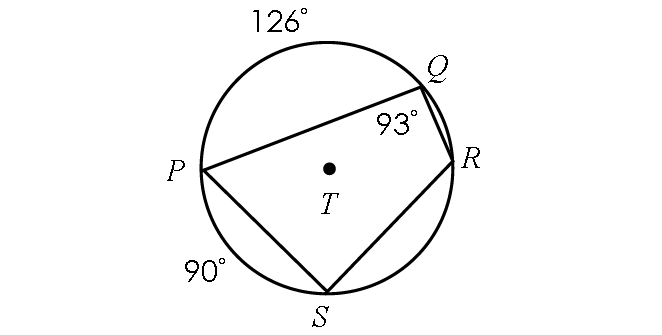
Solution :
In the above diagram, quadrilateral PQRS is inscribed in a circle. Then, its opposite angles are supplementary.
m∠P + m∠R = 180° -----(1)
m∠Q + m∠S = 180° -----(2)
Finding m∠P :
In the circle T above,
m∠arc SP + m∠arc PQ + m∠arc QRS = 360°
90° + 126° + m∠arc QRS = 360°
216° + m∠arc QRS = 360°
Subtract 216° from each side.
m∠arc QRS = 144°
By Inscribed Angle Theorem,
m∠P = 1/2 ⋅ m∠arc QRS
m∠P = 1/2 ⋅ 144°
m∠P = 72°
Finding m∠Q :
In (1), substitute m∠P = 72°.
m∠72° + m∠R = 180°
Subtract 72° from each side.
m∠R = 108°
Finding m∠S :
In (1), substitute m∠Q = 93°.
93° + m∠S = 180°
Subtract 93° from each side.
m∠S = 87°
Example 3 :
In the diagram shown below, find the following measures :
(i) m∠A, (ii) m∠B, (iii) m∠C and (ii) m∠D
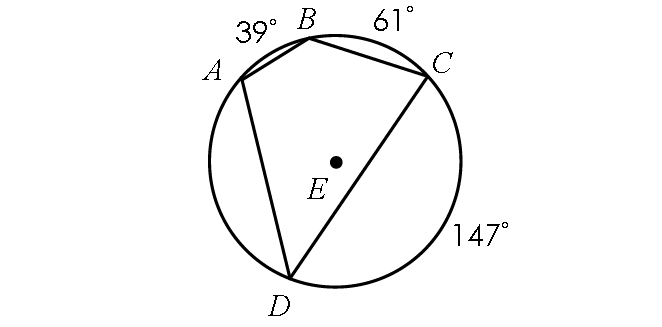
Solution :
In the above diagram, quadrilateral ABCD is inscribed in a circle. Then, its opposite angles are supplementary.
m∠A + m∠C = 180° -----(1)
m∠B + m∠D = 180° -----(2)
Finding m∠A :
In the circle T above,
m∠arc BC + m∠arc CD = 61° + 147°
m∠arc BC + m∠arc CD = 208°
Then,
m∠arc BCD = 208°
By Inscribed Angle Theorem,
m∠A = 1/2 ⋅ m∠arc BCD
m∠A = 1/2 ⋅ 208°
m∠A = 104°
Finding m∠C :
In (1), substitute m∠A = 104°.
m∠104° + m∠C = 180°
Subtract 104° from each side.
m∠C = 76°
Finding m∠D :
In the circle T above,
m∠arc AB + m∠arc BC = 39° + 61°
m∠arc AB + m∠arc BC = 100°
Then,
m∠arc ABC = 100°
By Inscribed Angle Theorem,
m∠D = 1/2 ⋅ m∠arc ABC
m∠D = 1/2 ⋅ 100°
m∠D = 50°
Finding m∠B :
In (2), substitute m∠D = 50°.
m∠B + 50° = 180°
Subtract 50° from each side.
m∠B = 130°
Example 4 :
Solve for x.
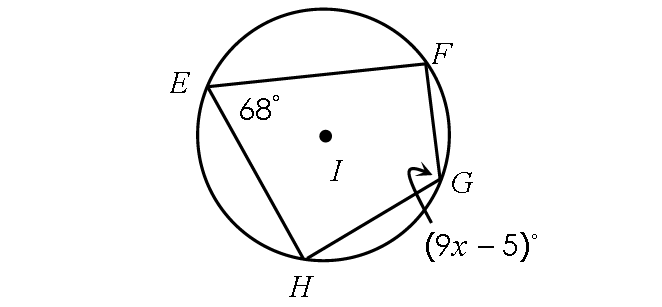
Solution :
In the above diagram, quadrilateral EFGH is inscribed in a circle. Then, its opposite angles are supplementary.
m∠E + m∠G = 180°
68° + (9x - 5)° = 180°
68 + 9x - 5 = 180
9x + 63 = 180°
Subtract 63 from each side.
9x = 117
Divide each side by 9.
x = 13
Example 5 :
Solve for x.
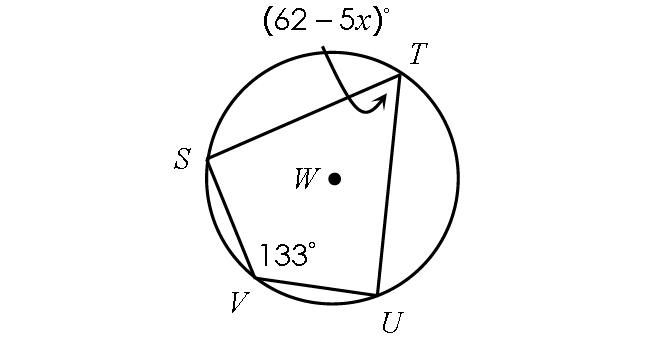
Solution :
In the above diagram, quadrilateral EFGH is inscribed in a circle. Then, its opposite angles are supplementary.
m∠E + m∠G = 180°
68° + (9x - 5)° = 180°
68 + 9x - 5 = 180
9x + 63 = 180°
Subtract 63 from each side.
9x = 117
Example 6 :
Solve for x.
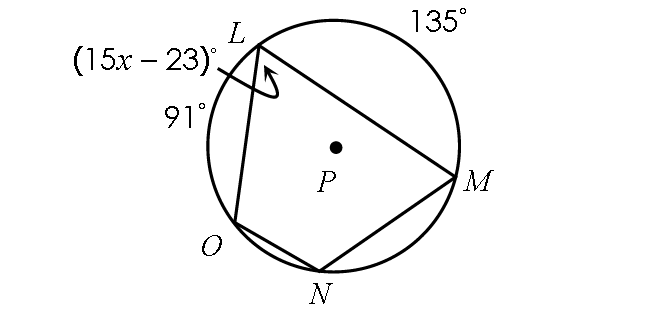
Solution :
In the above diagram, quadrilateral LMNO is inscribed in a circle. Then, its opposite angles are supplementary.
m∠L + m∠N = 180° -----(1)
In the circle P above,
m∠arc OL + m∠arc LM = 91° + 135°
m∠arc OL + m∠arc LM = 226°
Then,
m∠arc OLM = 226°
By Inscribed Angle Theorem,
m∠N = 1/2 ⋅ m∠arc OLM
m∠N = 1/2 ⋅ 226°
m∠N = 113°
In (1), substitute m∠L = (15x - 23)° and m∠N = 113°.
(15x - 23)° + 113° = 180°
15x - 23 + 113 = 180
15x + 90 = 180
Subtract 90 from each side.
15x = 90
Divide each side by 15.
x = 6
Subscribe to our ▶️ YouTube channel 🔴 for the latest videos, updates, and tips.
Kindly mail your feedback to v4formath@gmail.com
We always appreciate your feedback.
About Us | Contact Us | Privacy Policy
©All rights reserved. onlinemath4all.com

Recent Articles
-
10 Hard SAT Math Questions (Part - 40)
Dec 25, 25 08:30 AM
10 Hard SAT Math Questions (Part - 40) -
10 Hard SAT Math Questions (Part - 41)
Dec 24, 25 07:58 PM
10 Hard SAT Math Questions (Part - 41) -
ASTC Formula in Trigonometry
Dec 23, 25 11:34 PM
ASTC Formula in Trigonometry - Concepts - Examples and Solved Problems


